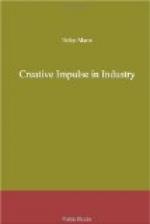This conception of the field of operation for engineers also described the field for educators. The latter have failed to seize the chance in the present industrial arrangement for the development of “the originating, choosing power” in the working man because they have been obsessed by the business appreciation of the working man’s power of adaptation. It is because they labor under this obsession that they turn industrial education into industrial training whenever they include industry in their curricula. Educators know that there is adventure in industry, but they believe that the adventure is the rare property of a few. They believe this so finally that they surrender this great field of experience with its priceless educational content without reserving the right of such experience even for youth. They know, as we all do, that industrial problems carry those who participate in their solution into pure and applied science; into the market of raw materials and finished products; into the search for unconquered wealth. They know that the marketing of goods is an extensive experience in the world of men and desires. They are not alone in their lack of courage to admit that limiting this experience perverts normal desires and creates false ones. For the sake of education it is to be hoped that such engineers as Mr. Wolf may overcome the timidity of educators, and that, in conjunction with men capable of productive enterprise, they will undertake to give young people an experience which is not tagged on to industry under the influence of profits, but which is inspired by the desire to produce and the opportunity to develop the inspiration.
Before establishing a system of industrial education like Germany’s, or extending the makeshift attempts which have been introduced here in the United States, it would seem well to undertake experiments which would stimulate the impulses of youth for creative experience, which would give them an industrial experience where the motive of exploitation is absent and where the stimulus was the content which the production of wealth offers. Such experiments would entail the organization of workshops in connection with schools in which the workshop experience was translated and extended.
Such workshops would be financed independently of the schools. They would not be financed on a basis of profits, but the capital invested would draw a legal rate of interest. The enterprise would be under the direction of managers competent in technological processes, in the estimate of costs, and the organization of the work on a basis of productive efficiency. The working force would be a corps of young people who had received their elementary school certificates and their certificates for employment together with the necessary complement of adult workers for the successful development of the plant. The working force would be paid the market rate of wages. The juvenile members of the force would be paid on a half-time basis as they would work in alternate shifts in the shop and in the school, so that work in the shop would be continuous and would run on full time. The exchange of shifts between the shop and school would occur daily or weekly or semi-weekly, as it was conducive to the health and the intellectual experience of the children and to the needs of production in the organization of the shop.




